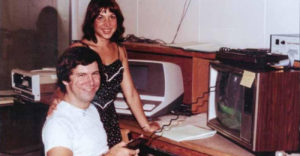 Yes, I know that it seems the Internet has swallowed the world, but that isn’t quite true. What actually happened was the opposite: The world captured the Internet.
Yes, I know that it seems the Internet has swallowed the world, but that isn’t quite true. What actually happened was the opposite: The world captured the Internet.
If that still sounds backwards to you, please stay with me. I’ll begin making sense of it by explaining how this post came together:
Last week I published an article that I knew would not be appreciated in certain circles. But for me, their approval or disapproval didn’t really matter, because I posted it directly to the Internet, not to some intermediate service.
Right away, I got a comment from someone who reported that, “I got banned on Reddit for saying this.” I had no doubt that the report was true, but when I thought of something to say in reply, all that lept to mind were things like, “Sorry to hear” and “Glad you spoke the truth anyway.” I felt that there was more to be said, but I wasn’t sure what.
And then I remembered the old days, as the Internet was first spreading across the world, to the horror of entrenched interests like the New York Times. It was an intoxicating time. There were no gatekeepers and interesting people were popping up on every side. Anyone could say whatever was on their mind. Not all of it was great, but it was free, open, unrestricted speech and thought. The overlords had no levers to grab and the future opened up wide.
In those days, getting onto the Internet was almost like walking out of a prison; it had an odd, subversive feel to it.
Those of you who were too young to experience this, please try to ask someone who was there.
Since then, the Internet has been overtaken by hucksters, techno-sociopaths, and mercenaries who saw it only as a something to exploit.
Rather than going through details on the process, I’ll simply say that intel agencies built mass surveillance systems, until Ferengi types with addictive services started feeding them deep surveillance on billions of people at once.
Over the past fifteen years, the vast majority of Internet traffic has been herded into Google and Facebook, where people were very carefully monitored and controlled.
And so it’s no surprise that we’ve seen massive censorship and banning: That was possible only because these holding pens aren’t actually the Internet: they are merely attached to the Internet.
That, of course, is what I ended up responding: Reddit is not the Internet; it’s a holding pen attached to the Internet.
The Internet was a wide-open, decentralized and free place, with no gatekeepers and no punishers; nor did it have almost any type of hierarchy: everyone was on the same level.
The Internet, in those early days, was the embodiment of actual freedom. It was a realm of the mind, not a realm of free accounts.
This chart may help you to understand the difference:
| The Internet |
NOT The Internet |
|
Web sites |
|
|
Bitcoin |
PayPal |
|
Comment sections |
|
|
“What I saw” |
The BBC |
|
Alta Vista |
|
|
Usenet |
|
It’s Still Here
The Internet is still here. On it, you can say whatever you want, or nearly so. It still has a Fed problem, but shutting down random subversives with court orders is a lot harder than running an algorithm to obliterate thousands of people at once.
And so, I think it’s time for a migration back to the Internet. It’s not perfect, but it is massively less bad than shiny holding pens masquerading as the Internet.
I’ll bring this toward a close with a prescient passage from Ray Bradbury:
We bombard people with sensation. That substitutes for thinking.
The Internet was where we thought, fought, learned, discovered and developed.
The holding pens are where flashing images, distractions and a stream of outrages hammer minds into submission.
May all who are able escape.
**
Paul Rosenberg
freemansperspective.com

I remember that wonderful feeling of access to information that was previously unknown to me.
I still try to directly go to a website via url than asking google, et. al.
NOSTR is also the Internet. Built by Bitcoiners, I think it’s the best option right now for freethinkers to find one another and communicate. Love your work.
Quite right, Nick. We mentioned NOSTR in the subscription letter some months back.
And thanks. 🙂
I’m new to all this but I’ve been a freethinker for decades, just not on the internet. I idn’t realize Twitter is not on the internet. I just got on X.com prime but haven’t mastered it yet. Is X under Musk different than Twitter?
All the free services are attached to the Internet but segregated from it. (Unless you’re on Facebook you can’t communicate with someone on Facebook.)
X has opened up a lot since Musk.